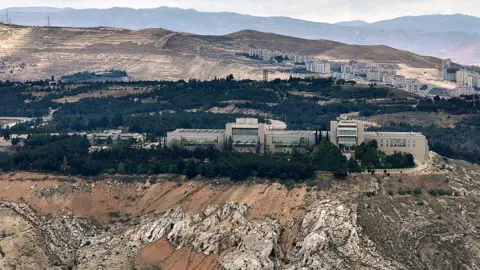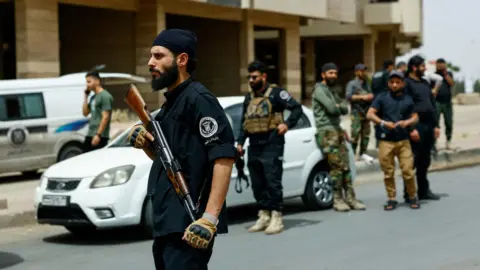Israel says it struck near Syria palace over violence in Druze areas
 AFP
AFPIsrael says its fighter jets bombed an area next to the presidential palace in Syria's capital, Damascus, as Israeli Prime Minister Benjamin Netanyahu vowed to protect the Druze religious minority following days of deadly sectarian violence.
Netanyahu said the strike was a "clear message to the Syrian regime" that Israel would "not allow the deployment of forces south of Damascus or any threat to the Druze community".
The Syrian presidency said it strongly condemned the strike, calling it a "dangerous escalation" intended to destabilise Syria.
Israel also carried out strikes south of Damascus on Wednesday during clashes between Druze gunmen, security forces and allied Sunni Islamist fighters.
UN Secretary-General Antonio Guterres also criticised the latest air strike, calling it a "violation of Syria's sovereignty".
In a statement delivered by his spokesman, Guterres called for Israel to stop such attacks and to respect Syria's "unity, its territorial integrity and its independence".
A spiritual leader of Syria's Druze, Sheikh Hikmat al-Hijri, condemned the violence on Thursday as an "unjustifiable genocidal campaign" against his community and called for intervention by "international forces to maintain peace".
Other Druze religious leaders put out a statement early on Friday confirming what they said was the community's "commitment to a country that includes all Syrians, a nation that is free of strife", according to the Associated Press.
They also reportedly said the state should be activated in Suweida province, and that authorities should be in control of the Suweida-Damascus highway.
The Syrian government said it had deployed security forces to Druze areas to combat "outlaw groups" which it accused of instigating the clashes.
According to the Syrian Observatory for Human Rights (SOHR), a UK-based monitoring group, at least 109 people have been killed this week in Ashrafiyat Sahnaya, a town in the southern outskirts of Damascus, the mainly Druze suburb of Jaramana, and the southern province of Suweida, which has a Druze majority.
It says that includes 11 Druze civilians and 26 Druze fighters, as well as another 42 Druze men who were shot dead in an "ambush" by security forces while travelling from Suweida to Damascus on Wednesday. Thirty members of the General Security service and allied fighters have also been killed, it says.
Istanbul-based Syria TV reported that the Israeli air strike near the presidential palace appeared to have targeted an empty area, and that there were no reports of casualties or material damage.
Israel's Defence Minister issued a statement saying that when the Syrian president woke up and saw the results he would "understand well that Israel is determined to prevent harm to the Druze in Syria".
"It is [Sharaa's] duty to protect the Druze in the suburbs of Damascus from jihadist assailants and to allow the hundreds of thousands of Druze in Suweida and Jabal al-Druze to defend themselves on their own, rather than sending jihadist forces into their communities," he added.
In a statement released on Friday afternoon, the Syrian presidency said it "condemned in the strongest terms the bombing of the presidential palace yesterday by the Israeli occupation, which constitutes a dangerous escalation against state institutions and the sovereignty of the state".
"This reprehensible attack reflects the continuation of reckless movements that seek to destabilize the country and exacerbate security crises," it added.
The presidency also called on the international community to stand by Syria in confronting the attacks, which it said violated international law.
A Druze religious leader in Suweida, Sheikh Hamoud al-Hinawi, meanwhile told the BBC that the situation was "still tense" in the affected areas.
"What is happening right now is sectarian targeting by extremist elements [and] it is the duty of the state to protect civilians," he said.
"We support the rule of law and national sovereignty of Syria, as long as the national government is protecting its citizens and adhering to its commitment to rebuilding a modern Syria."
When asked whether he supported the Israeli intervention, Sheikh Hinawi said: "It's not a matter of whether I am for or against Israel - it is a matter of life and death for us and if we are being attacked we have every right defend ourselves."
On Thursday, a member of the security forces deployed in Ashrafiyat Sahnaya told the BBC that they were "not targeting any sect, but rather dealing with an armed group acting outside the law, regardless of its religious affiliation", adding: "Any such group will be held accountable."
 Reuters
ReutersThe sectarian violence erupted in Jaramana on Monday night after an audio clip of a man insulting the Prophet Muhammad circulated on social media and angered Sunni Muslims. It was attributed to a Druze cleric, but he denied any responsibility. The interior ministry also said a preliminary inquiry had cleared him.
The Druze faith is an offshoot of Shia Islam with its own unique identity and beliefs. Half its roughly one million followers live in Syria, where they make up about 3% of the population, while there are smaller communities in Lebanon, Israel and the occupied Golan Heights.
Syria's transitional President, Ahmed al-Sharaa, has promised to protect the country's many religious and ethnic minorities since his Sunni Islamist group led the rebel offensive that overthrew Bashar al-Assad's regime in December after 13 years of devastating civil war.
However, the mass killings of hundreds of civilians from Assad's minority Alawite sect in the western coastal region in March, during clashes between the new security forces and Assad loyalists, hardened fears among minority communities.
In February, Israel's prime minister warned that he would not "tolerate any threat to the Druze community in southern Syria" from the country's new security forces.
Netanyahu also demanded the complete demilitarisation of Suweida and two other southern provinces, saying Israel saw Sharaa's Sunni Islamist group, Hayat Tahrir al-Sham (HTS), as a threat. HTS is a former al-Qaeda affiliate that is still designated as a terrorist organisation by the UN, the US, the EU and the UK.
The Israeli military has already carried out hundreds of strikes across Syria to destroy the country's military assets over the past four months. It has also sent troops into the UN-monitored demilitarised buffer zone between the Israeli-occupied Golan Heights and Syria, as well as several adjoining areas and the summit of Mount Hermon.
